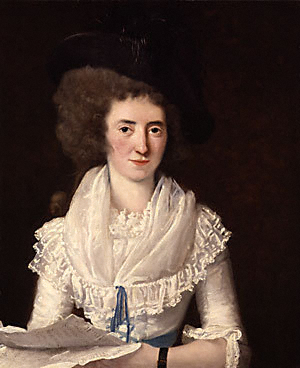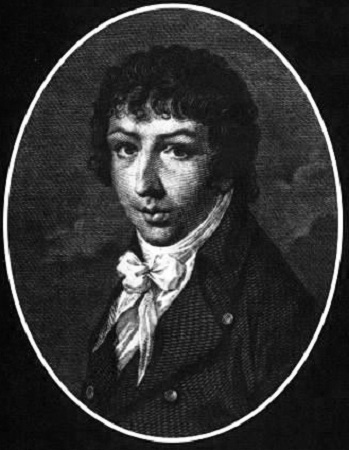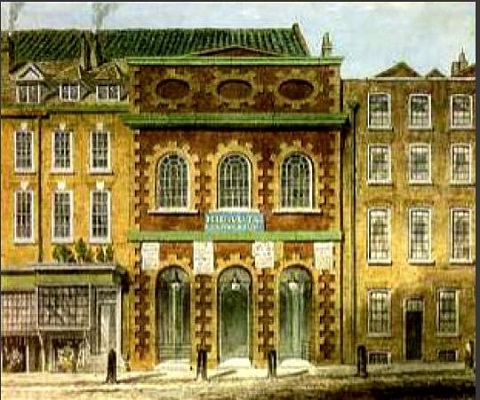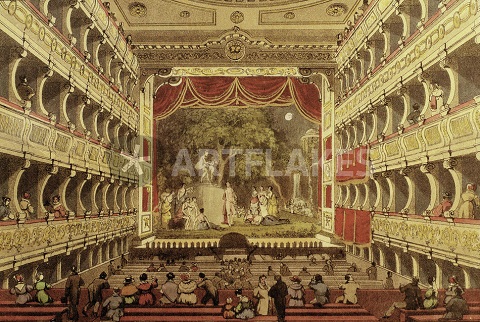His celebrity-sibling, the soprano Nancy Storace, a favourite with Emperor
Joseph II and prima buffa in the Italian opera troupe that he had
established at the Burgtheater two years earlier, sang the role of Eginia -
a young girl previously enamoured of Artidoro and now, as compelled by her
fortune-hunting father, unhappily wed to Casimiro. Alongside Nancy was a
roll call of Vienna’s finest: tenors Michael Kelly (as Valente, a
middle-aged boffin) and Vincenzo Calvesi (Casimiro), baritone Stefano
Mandini (Artidoro), bass Francesco Benucci (as Rosmondo, Casimiro’s grumpy,
suspicious father), and sopranos Catarina Cavalieri (as Enrichetta,
Casimiro’s sister) and Therese Teyber (as the meddling maid, Bettina).
Gli sposi malcontenti
was followed in 1786 by Gli equivoci, with a libretto by Da Ponte
based on Shakespeare’s The Comedy of Errors, which may well make
it the first Shakespearian opera, predating Salieri’s Falstaff by
several years. Yet, despite this promising start in Vienna, Stephen Storace
ended his short career as de facto composer-in-residence at
Richard Sheridan’s Drury Lane Theatre, having failed to find favour at
London’s Italian opera company, and was scorned by subsequent critics as an
uninspired arranger of pastiches. He died in 1796, at the age of just
thirty-three years.
It was probably due to Nancy’s influence that her brother, who at that time
had only some chamber music and a handful of songs to his name, and no
previous experience of writing for the stage, was commissioned to write an
opera for the Burgtheater. Sadly, it was also owing to Nancy’s
incapacitation at the premiere, that the first night was a disaster.
Encouraged by her mother, Elizabeth, to wed the English violinist John
Fisher (at eighteen years-of-age, she was barely half Fisher’s age), Nancy
found herself married to a violent drunkard whose abuse adversely affected
her health and threatened to derail her nascent career in Vienna. By the
time, just a few months after their marriage on 29th March 1784,
the Emperor had banned Fisher from Vienna for his abusive behaviour, Nancy
was depressed, ill and pregnant. During the premiere of Gli sposi malcontenti she collapsed on-stage mid-aria in the
opening act (some reports say that the performance was abandoned, others
that the cover, Celestine Coltellini, stepped in). Nancy gave birth a few
months later, whereupon Elizabeth Storace placed the baby girl in a
foundling hospital, declaring that they didn’t care if the child lived or
died: the unfortunate and unwanted baby duly obliged by perishing a few
weeks later.
Nancy's return to the stage four months later was marked by the performance
of the Cantata per la ricuperata di Ophelia, composed specially
for the occasion by Mozart, Salieri and the unidentified ‘Cornetti’:
perhaps it is not too far-fetched to speculate that Stephen himself was
that third, anonymous contributor?
 Ann Selina (Nacny) Storace (1765-1817), attrib. Benjamin Vandergucht, c.1790 © National Portrait Gallery, London.
Ann Selina (Nacny) Storace (1765-1817), attrib. Benjamin Vandergucht, c.1790 © National Portrait Gallery, London.
For, despite this inauspicious start, Gli sposi malcontenti
entered the Burgtheater repertory and received many performances. In his
book Antonio Salieri and Viennese Opera (University of Chicago
Press, 1998), John Rice observes that while Emperor Joseph mixed comic
operas written specifically for his Italian troupe with operatic imports
from abroad - the troupe presented 62 operas at the Burgtheater between
April 1783 and Joseph’s death in Feb 1790, of which only 23 were especially
written for Vienna - the ‘home-grown’ operas tended to be given many more
performances. Several operas received more than 20 performances and half of
this group of favourites were written specifically for the Viennese troupe,
including Figaro, Paisiello’s Il re Teodoro, Martìn’sUna cosa rara and L’arbore di Diana, Salieri’sLa grotta di Trofonio and Axur, and Storace’s Gli sposi malcontenti.
Performances of Gli sposi malcontenti were subsequently given
across Europe: in Prague and Leipzig the following year, in Dresden in
1789, and (in French translation) in Paris in 1790. Some arias were
arranged for wind band by Johann Went - a sign of their popularity and
dissemination.
The son of a professional musician from Naples, Stephano, who had settled
in London during the 1950s, and his wife Elizabeth, whose father, John
Trusler, was an esteemed pastry cook and the proprietor of Marylebone
Gardens, Stephen was born in London on 4th April 1762. A meeting
with the Mozart family during their 1764-65 sojourn in England, encouraged
Stephano to follow Leopold Mozart’s example in the education of his two
musical prodigies, Wolfgang and Nannerl. Initially, Stephano taught his son
violin, keyboard and composition, but fearing (probably rightly) that the
quality of music education in London was inadequate, he sent Stephen to his
alma mater, the San Onofrio Conservatory, under the care of an uncle who
was a local bishop.
According to the Welsh landscape painter Thomas Jones, Stephen’s
attentiveness to his studies left something to be desired. In his memoirs,
Jones recounts several sketching expeditions throughout Italy which he
undertook with the ‘a giddy, thoughtless young fellow’ as his companion,
and the scrapes they got into may have prompted Stephano to travel to Italy
in 1778 with his wife and the then twelve-year-old Nancy, who was already
marking quite a mark as a singing prodigy.
In 1779, Stephen left San Onofrio and travelled with his family as Nancy
pursued her career as an operatic soprano. The siblings met the Irish tenor
Michael Kelly who, in his Reminiscences (1826), described them as
‘the warmest and most attached of all my friends’, and in 1783 Nancy and
Kelly became members of Emperor Joseph II's opera buffa company at
the Burgtheater.
 Stephen Storace.
Stephen Storace.
And, there they remained until Nancy, Stephen and Kelly returned to London
in 1787. Their departure was delayed by Stephen’s arrest on 20th
February by what Kelly described in his Reminiscences as drunken
brawling at a Carnival ball. And, if we should doubt the garrulous
Irishman’s account, Jane Girdham has shown that Stephen’s own words confirm
the substance of the tenor’s tale, in the form of a letter addressed to a
friend, J. Serres at 1 St George’s Row, Oxford Street, London, written on
the morning after the night before [original spelling and punctuation
preserved]:
'You might not have recieved a letter from me, so early as this, long good
friend had it not been owing to a ridiculous circumstance that happen’d
last night or rather early this morning - to make short of the story - it
is some hours since I have been in a guard:house under an arrest-and of
course having much leisure I know no better mode of passing my time than
devoting it to my friends in England-but to inform you of some of the
particulars - you must know that there never perhaps were so hard:a going sett of English in any one town out of England - as
are at present in Vienna - we have lived these last six weeks almost in one
continual scene of riot - amongst ourselves - as long as it
remain’d so, nobody could find fault-but lately some of our youths -
high:charged with the juice of French grapes - have made their occasional
sallies - & exposed themselves to the natives especially at the
Ridotta’s, or Masquerades - many of which have been given in the course of
the newly expired Carneval a few nights ago the Honbl: Charles Lennox - Ld:
Clifford and one or two others - courted some ladies-with rather too much
vehemence-which occasion'd an order-that every Englishman that behaved with
the least impropriety, at the ensueing Ridotta - (the one last night)
should be put under an arrest-It so happen’d that about three oclock this
morning as my Sister was dancing a minuet with Ld: Barnard, a Man who was
standing by chose to stand in such a manner that Lord Barnard, turning the
corner inadvertently trod on his toe - upon which he was rather
impertinent-Ld: B took no notice but proceeded - on again coming to the
same corner - the Gentleman took an opportunity of advancing still further
into the ring & had nearly thrown him down - upon which I who was a
stander by-with more spirit than prudence-asked him, ‘what he meant by
being so impertinent as to attempt throwing down any gentleman that was
dancing’ - he then immediately chose to use some very ungentlemanlike
language - which I (who had rather too much Champaigne in me, though far
beneath intoxication) could not brook - inshort words begat words - the
whole rooms were presently in a confusion - the report was that an Englishman had mis:behaved we were almost press’d to death-by the
multitudes that crowded round:us - my antagonist proved to be an officer-he
immediatly apply’d to the officer of the guard - who sans:cerimonie put me under charge of a corporal’s guard - and I
was conducted to the guard-house - from which place I have the honor of
addressing to you this epistle - as all the English have taken up this
matter warmly - I immagine I shall soon be liberated-and we shall strive
hard to bring the aggressor to condign punishment.'
Storace seems to have borne his incarceration lightly, concluding his
letter, ‘I can hardly refrain from laughing at the Idea of myself in
durance vile.’
[1]
In her book
English Opera in Late Eighteenth Century London: Stephen Storace at
Drury Lane
(Clarendon Press, 1997), Gardham presents a comprehensive account of the
little that is known of the details of Stephen’s biography, but remarks:
‘We may regret that the best documented event in Storace’s life was an
incident of youthful indiscretion.’
 King's Theatre, Haymarket, 1783, William Capon.
King's Theatre, Haymarket, 1783, William Capon.
In London, the Storaces hoped to continue their careers in Italian opera at
the King’s Theatre, meeting with some initial success as a singer and, in
Stephen’s case, erstwhile arranger of pasticcios and director of
music. Yet, despite their training and experience in opera buffa
they were never fully accepted by the Italian clique. (Ironically, while
Stephen emphasised his Englishness - both the score and libretto of Gli sposi malcontenti naming him as ‘Stefano Storace Inglese’ -
Nancy affected an Italian accent and insisted her name be pronounced
‘Stora-ce’.) In 1788, Stephen moved to the Theatre Royal Drury Lane, where
Sheridan already had Kelly in his employ, and he was followed shortly after
by Nancy who became the company’s highest-paid singer.
After a failed attempt with a third Italian opera, La camariera astuta, Stephen devoted his Haymarket years to
writing operas in English with spoken dialogue. Of his sixteen English
operas, only one, No Song, no Supper, survives in full score. Not
that these English operas were not popular: as late as 1864 a revival of No song, no supper at the Haymarket Theatre was, according to the
reviewer in The Era (18 December) ‘most favourably received’, and
the hope expressed that ‘a few more musical pieces from the old school may
be similarly rescued from undeserved obscurity’. As Robert Fiske notes: ‘In
view of numerous revivals in different theatres, many copies must have
existed; presumably they perished in theatrical conflagrations. Twelve of
the others were published, but only in vocal score with occasional
instrumental indications, a sad fate for a composer in a position to
benefit from Mozart's orchestration.’
[2]
And, the US was not immune to the pleasures of Stephen’s pasticcios. Otto E. Albrecht has charted opera performances in
Philadelphia during the years 1800-30, noting that of the 258 different
operas presented during this period ‘155 were British imports from the
three Theatres Royal, Covent Garden, Drury Lane and the Haymarket’, and
that ‘Those three Mozartians who left Vienna together in 1787, Michael
Kelly the Irishman, Stephen Storace the Italian and Thomas Attwood the
Londoner, between them accounted for no fewer than thirty of the operas
given in Philadelphia in this period.’
[3]
Gli sposi malcontenti
was, however, never performed in England during the 18th or 19 th centuries, although Storace was not averse to recycling his
material and made frequent use of excerpts from both Gli equivoci
and Gli sposi malcontenti in his English operas. From the latter,
Storace imported two arias into The Pirates (1792), reused the
overture in The Cherokee (1794) and made use of other excerpts in Mahmoud (1796).
The English premiere of Gli sposi malcontenti was given by Opera
Viva at the New Theatre, King’s College London in March 1985, in a new
English translation by Brian Trowell but the opera has not been performed
since. Following Bampton Classical Opera’s 2000 production of
Gli equivoci
and more recent
commemorative concert
on the bicentenary of Nancy’s death, the company’s decision to return to
the Storace siblings for their 2019 repertoire choice is most welcome.
After performances earlier this summer at Bampton and Westonbirt, they
bring their production of Gli sposi malcontenti - retitled in
characteristically droll fashion, as Bride & Gloom (and
performed in Trowell’s translation) - to St John’s Smith Square on Tuesday
17th September.
The libretto of Gli sposi malcontenti adheres to the familiar buffa recipe. Set in 18th-century Genoa, as the title
suggests the plot centres on the ‘discontented newly-weds’, Eginia and
Casimiro. Eginia is still burning a candle for Artidoro, but the latter’s
eyes have been drawn by Casimiro’s sister, Enrichetta, and the pair are
planning to elope. Valente, enraged by Enrichetta’s rejection of his own
affections, salves his jealousy by spreading rumours that Artidoro and
Eginia are having an affair. Casimiro and Rosmondo are alarmed by
Artidoro’s suspicious behaviour. Valente, believing that his scheming is
being aided by the maid, Bettina, exults in his success. But, Bettina has
in fact exposed Valente’s villainy to Artidoro who arranges a nocturnal
gathering in the garden so that the truth can be revealed, Eginia’s honour
restored, and his marriage to Enrichetta assured.
Performed the year before the Viennese premiere of Le nozze di Figaro, Gli sposi malcontenti anticipates
several features of Da Ponte’s action in the latter, not least an episode
in which Artidoro hides behind and on a sofa, the muddle of mistaken
identities in the night-time garden, and the final scene of reconciliation
which sees Valente forgiven for his intrigues. Evidently, Beaumarchais’ Le mariage de Figaro was well-known, despite being banned in
Vienna at that time.
Grove
describes Gaetano Brunati’s libretto as well-constructed and suggests that
Storace ‘manages to infuse the farcical misunderstandings with touching
humanity. The music has a Mozartian flavour, combined with an English
quality sometimes tending towards the ballad air’. Indeed, Robert Fiske ( Ibid.) has remarked that ‘About the time that his sister
Nancy was creating the role of Susanna in Figaro, Stephen was
having lessons in Vienna from its composer’, and although there is no
certain evidence that Mozart gave Stephen lessons, they were certainly in
close contact, and one may detect a Mozartian flavour in some aspects of
his style, not least in the precedence that Stephen gave the music over the
text. Fiske draws attention to an article on Storace in the Thespian Dictionary of 1802, which suggests that Stephen’s
approach ‘cuts across the whole theory of English opera’: ‘It must,
however, be remarked, that the words [of his librettos] were chiefly
adapted to the music: indeed, Mr. Storace openly declared in a
music-seller's shop in Cheapside (then Longman & Broderip’s) that it
was impossible for any author to produce a good opera, without previously
consulting his intended composer, for, added he, the songs must be
introduced as he pleases, and the words (which are a secondary
consideration) be written agreeably to his directions.’
Then, there is his predilection for ensembles and finales which further the
action. Fiske goes as far as to suggest that, had he lived, ‘Storace might
well have established fully-composed comic opera in the London playhouses.’
He argues that, at the King’s Theatre, Stephen: ‘turned his attention to
educating his new public, who were primarily play-goers, and training them
to foster a greater appreciation of the increasing integration of libretto
and music on the stage. He introduced his London audiences to the
multi-section finales that were commonplace in opera buffa, most
notably in The Pirates (1792).’
Interestingly, Dorothea Link included arias by Stephen Storace in her three
editions, Arias for Nancy Storace, Mozart’s First Susanna (2002),Arias for Francesco Benucci,Mozart’s first Figaro and Guglielmo (2004), andArias for Vincenzo Calvesi: Mozart’s First Ferrando (2011). In the preface to the 2002 edition which brings together fifteen
of Nancy’s most popular arias, Link sets out her aim to ‘establish a basis
for creating a vocal profile for Nancy Storace’ and to ‘allow aspiring
Susannas to sing their way into the role with comparable repertory’.
Some expected ‘hits’ appear, such as ‘Deh vieni, non tardar’ ( Figaro), ‘Ah non ver che in seno’ from Salieri’s
La scuola de gelosi
, and ‘D’un dolce amor la face’ and ‘La ra la ra, che filosofo buffon’ from
the latter’s
La grotta di Trofonio
,
but Link also notes that Stephen Storace composed many of the ‘hits in
productions other than premieres’, and selects five examples from his work,
including ‘Compatite miei signori’ (1783), a substitute aria for Giuseppe
Sarti’s Fra i due litiganti, and ‘Care donne che bramate’ which
was inserted into Paisiello’s Il re Teodoro in Venezia for the
opera’s London premiere in December 1787. Stephen’s recitative and aria
‘Fra quest’orror ... Ma tarde le la grime’ from Gli sposi malcontenti serves as ‘an example of an aria for which
Nancy wished to be admired’.
To conclude, Fiske’s assessment of Stephen Storace’s work suggests that it
has languished in undeserved neglect:
‘Alone of English eighteenth-century composers, Storace and [Charles]
Dibdin had a sense of the theatre, a feeling for characterisation and
dramatic effect. Arne's melody was more refined, but neither he, [William]
Boyce, nor [William] Shield, let alone small fry like [Samuel] Arnold, had
this gift for composing so to speak visually, with the stage effect in mind
as the notes go down on paper. Nor had they the advantage of knowing Figaro and its composer.’
Bampton Classical Opera performs Stephen Storace’s
Gli sposi malcontenti (Bride & Gloom) at
St John’s Smith Square, London at 7pm on Tuesday 17th September 2019. There will
be a pre-performance talk at 6pm.
Claire Seymour
[1]
S. Storace to J. Serres Esq., 21st February 1787, Vienna
(Harvard Theatre Collection), reproduced in Jane Girdham, 'Note on
Stephen Storace and Michael Kelly', Music & Letters
76/1 (1995): 64-67.
[2]
Roger Fiske, 'The Operas of Stephen Storace', PRMA 86 (1959-60): 29-44.
[3]
Albrecht, Otto E. Albrecht, 'Opera in Philadelphia, 1800-1830', Journal of the American Musicological Society 32/3 (1979): 499-515. The operas by Storace identified by Albrecht are: My Grandmother, 27th January 1804; The Haunted Tower, or The Baron of Oakland, 3rd February 1800;The Siege of Belgrade, 11th February 1800; No Song, no Supper, 17th February 1800; The Prize, or 2, 5, 3, 8, 9th April 1800; The Doctor and the Apothecary, 6th February
1804; The Iron Chest, or Honor’s Victim, 1810. These
operas were all also performed in Philadelphia during the 1790s.



